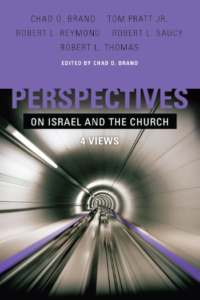
Author: Brand, Chad
Genre: Theology - Dispensationalism, Theology - Ecclesiology, Theology - General
Tags: Dispensationalism, Doctrine / Theology, Modern Authors / Theological Issues
Series: Perspectives
Rick Shrader‘s Review:
This is one of many “Views” books which give the reader four different views on a subject. This volume (2015) concerns the views on covenant theology and dispensational theology with a newer variation of each.
The Traditional Covenantal View, by Robert L. Reymond, professor of Theology emeritus at Knox Theological Seminary. Covenant Theology has been around since the Reformation. It gets its name from its belief in three “theological” covenants: the covenant of works (with Adam in the garden); the covenant of grace (in effect since the fall of Adam into sin); and the covenant of redemption (made between the Father and the Son in eternity past). They do not deny the biblical covenants but see that God is working out His will by electing those whom the Father previously gave to the Son, and saving them all during the covenant of grace from the fall until the end of the world. This is a basic amillennial view and a “replacement theology” whereby the church (i.e., the elect) replaces Israel as God’s promised people.
The Traditional Dispensational View, by Robert L. Thomas, Professor of New Testament emeritus at The Master’s Seminary. Thomas deals with Israel in the OT and the NT. In the OT Thomas shows that the land promise has never been fulfilled literally to Israel. He says, “A literal approach interprets the words as God intended them and as Abram understood them. No typology. No spiritualizing. No symbolism. No preunderstanding of how the words must fit into a system of theology.” In the NT he shows how “Jesus might have canceled God’s promises to Abraham but did not.” Here Thomas reviews 10 times in the life of Christ where this could have been done if that is what Christ intended. Obviously He did not. Then Thomas reviews 6 ways in which the “Apostles might have canceled God’s promises to Abraham but did not.” After reviewing the biblical covenants showing the literal promises to Israel, Thomas reviews the book of Revelation (about which he is well-known for his large 2-volume commentary) and writes, “The book of Revelation is full of references to God’s faithfulness in fulfilling his promises to national Israel.”
The Progressive Dispensational View, by Robert L. Saucy, distinguished professor of Systematic Theology at Talbot School of Theology. In the early 1990s Saucy of Talbot along with Craig Blaising and Darrell Bock of Dallas Seminary, and many others since, introduced significant changes to traditional dispensationalism. These include hermeneutical and ecclesiastical changes, prophetic and covenantal changes. Saucy includes three in this volume. 1) Israel is still God’s special people with promises of a millennial future. 2) The church participates with Israel in the new covenant as one combined people of God, not as a uniquely separate entity. 3) The kingdom of God exists now in an inaugurated form called “already-not yet.” It is here already in an inaugurated, or spiritual, form but will also come later in a material form. Prominent in Saucy’s presentation is the view that the church is establishing the kingdom by its evangelism to the Gentile world. Saved Jews and Gentiles will eventually inhabit the millennial kingdom as a united people of God. The eternal state is often included as a renewed earth and an eternal earthly kingdom. It should be noted also that the description of “progressive” does not mean culturally contemporary, but rather as a more biblical theological, i.e., progressive revelatory view. The view also necessarily includes much more typical and allegorical hermeneutics than its predecessors.
The Progressive Covenantal View, by Chad O. Brand, speaker and lecturer and Tom Pratt Jr., president of Eagle Rock Ministries. This newer version of covenant theology has emerged in that last 15-20 years. Its voice has mainly come from Stephen J. Wellum, Brent E. Parker, and Peter Gentry of The Southern Baptist Theological Seminary. It is a more mixed view on eschatology than its forefather, covenant theology, with some a, post, and pre-millennial views. Its primary thesis is that all Old Testament covenants and promises are fulfilled in the person of Jesus Christ. His followers are one people of God who fulfill the promises as a kingdom—some even propose they are the promised “land” (obviously in a spiritual way) of the kingdom. Progressive Covenantalism is constantly developing.
As a traditional dispensationalist, I am concerned with the two “progressive” developments to the historical views of Israel, church, and the kingdom including the complementary hermeneutic, supersessionism, and expanding views of the new covenant.
